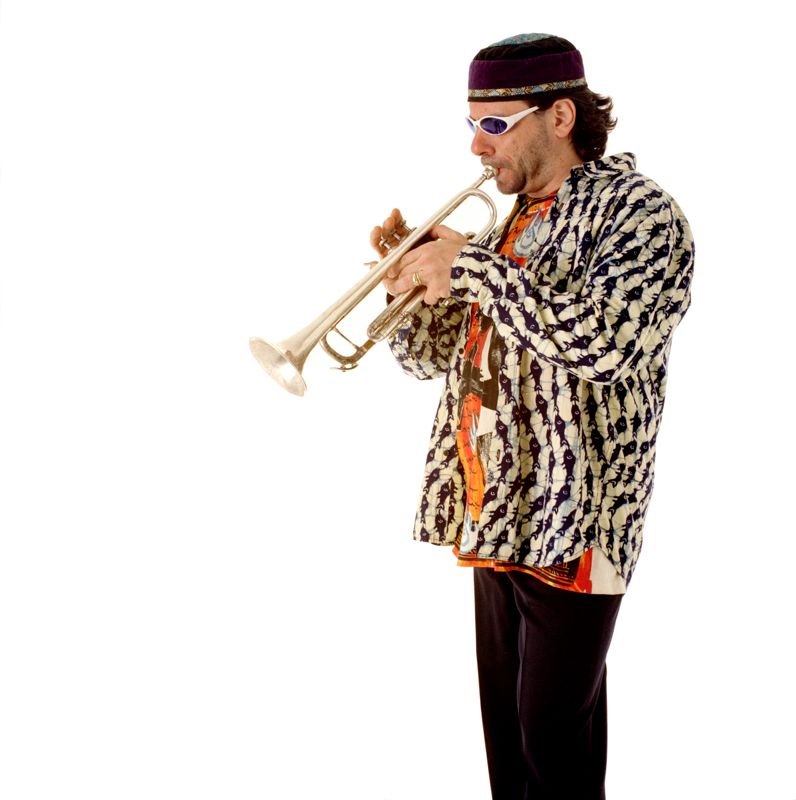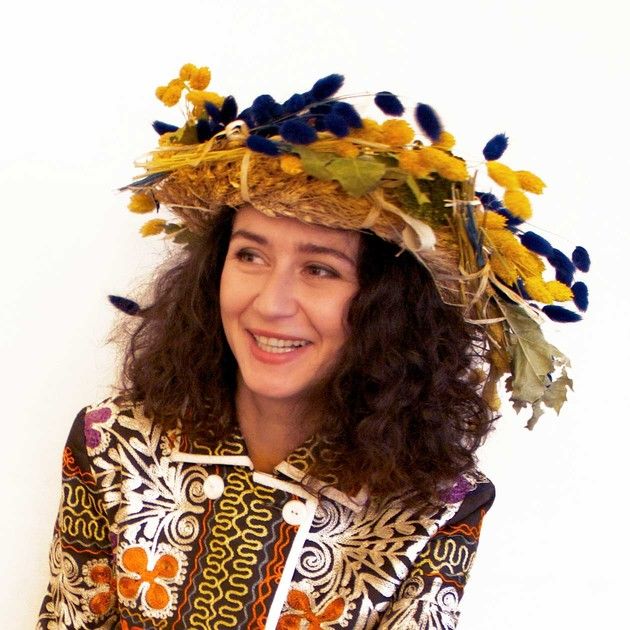
[caption id="attachment_45990" align="alignright" width="471"] Frank London[/caption]
Frank London[/caption]
By Tim Sommer
No matter where I am, I am never alone. Thousands of generations follow me, live within my genes, shape my character, my tastes, my appearance. The DNA of millennia wash and wave and wiggle and creak through every cell of my body (and yours, too!). This DNA vibrates with music, too, from Bronze Age chants to Second Temple drones to the Lullabies of the lost, shattered Shtetl. As modern as my music collection may be, the melody and rhythms of this past remain part of my collective consciousness.
Which is all to say that Klezmer Music, with it’s sinewy, sighing, melancholy and leaping evocations of The Old Country, is wonderfully alive within the souls of any and all of us with a drop of Eastern European blood. Not only that, but certain musicians are insuring that Klezmer is a living, breathing art form that is alive with modern magic and many novel influences.
“We live in the 21st century, so it would be strange to only copy the tradition,” says Polina Shepherd, one of the modern masters of Klezmer music. She will perform on Saturday, November 28 at Temple Adas Israel in Sag Harbor with Frank London, another world famous wizard of contemporary Klezmer. “And in any case,” Ms. Shepherd continues, “what do we define as ‘the tradition?’ Our lifestyle and mentality constantly changes, so does the context of the music.”
If you are not familiar with Klezmer music, it is (very) generally defined as the traditional music of Eastern European Jews of Ashkenazi descent. It thrived in Europe prior to the horror and diaspora of the Second World War, and immigrants bought it all over the world.
“There is a constant debate about the term, and I would be stepping into a dangerous territory if I tried to define Klezmer music,” says Ms. Shepherd, who was raised in Siberia and whose own elegiac, acrobatic, and emotionally powerful music recalls everyone from Bjork to the Cantors you hear at synagogue. “The term works well for record stores so there is a clear section in shops for this kind of Jewish music. To me it means ‘a vessel of song’ - the two root words are ‘kley’ - vessel, instrument - and ‘zemer’ - song. My closest colleagues and I are usually presented under the umbrella of World music,” Ms. Shepherd continues. “We use our own traditional music and other traditional kinds of music and mix it all up with whichever modern styles we absorb through experience. It acknowledges that the world is one organism and we play music of the world and to the world without boundaries.”
When I listen to Polina Shepherd, I hear music that unites a world that is as full of melody as it is as full of conflict, and builds cultural bridges at exactly the time we need them.
[caption id="attachment_45989" align="alignleft" width="501"] Polina Skovoroda-Shepherd[/caption]
Polina Skovoroda-Shepherd[/caption]
“I hope so” enthuses Ms. Shepherd, “I am glad it is audible. I wish we saw more symmetry and beauty around and focused on that rather than on our differences.
I grew up in Tatarstan, which is an Islamic republic in central Russia. So I had the muezzin calling for prayers from the top of a Mosque in my ears since my childhood. I love their vocal ornamentation and I, too, hear similarities in our cultures.”
At Temple Adas on Saturday, Mr. London and Ms. Shepherd (whose latest album, “Aheym -- Homeward,” was released under the name Sklamberg & The Shepherds, a group that also features her husband, Merlin Shepherd) will not only honor the past, but insist, with joy, that Klezmer can and will move forward into the future. In the work of Ms. Shepherd and Ms. London, you not only hear elements from all over the earth, but you may also be transported to a place that may have as much to do with Kate Bush and the Cocteau Twins as the B&H Dairy Restaurant and the Pale of Settlement.
Ms. Shepherd is hugely excited to be performing with Mr. Shepherd, a Grammy Award winner who has recorded and performed with some of the biggest names in classical, pop, and avant-garde music.
“Frank London was one of the people who changed my life and inspired me to work in this area,” notes Ms. Shepherd. “We met in 2000 at a Klezmer festival in Crimea where he was brought in as a star of Klezmer to help us bring our culture back. Frank came and spent the whole festival week not only giving us formal lessons but also jamming day and night. His limitless freedom of musical thinking is incredible. He mixes elements of music I never thought would match - he just makes it all work. It doesn’t matter if it is a Brazilian rhythm, a chord from a Mahler’s symphony or a Tatar melody. He makes a delicious borscht out of it all.”
With so much beautiful cultural baggage to cart on to the stage, what can we expect at the Sag Harbor concert?
“The program will be a mixture of traditional Klezmer tunes and Yiddish songs with original compositions,” Ms. Shepherd notes. “Both Frank and I love making music spontaneously so the audience will witness the process of arranging music on the spot. It will generally be non-formal and interactive - there will be a lot of audience participation as well as some focused, quiet meditative numbers.”
Ms. Shepherd is also hugely optimistic about the future of Klezmer music, and that it will stay alive, healthy, and progressive.
“I witness hundreds of young people making new Klezmer music, learning and teaching Yiddish, building communities, playing in bands,” Ms. Shepherd says. “This is a generation of musicians in their 30s and 40s, and now their children are learning Yiddish and joining the bands. Our music has as much a future as music in general.”
Polina Skovoroda-Shepherd and Frank London perform on Saturday, November 28, at Temple Adas Israel, 30 Atlantic Avenue, Sag Harbor. The concert follows the Havdalah Service at 5:30 p.m. Admission $20. For more information, (631) 725-0904 or visit www.templeadasisrael.org.